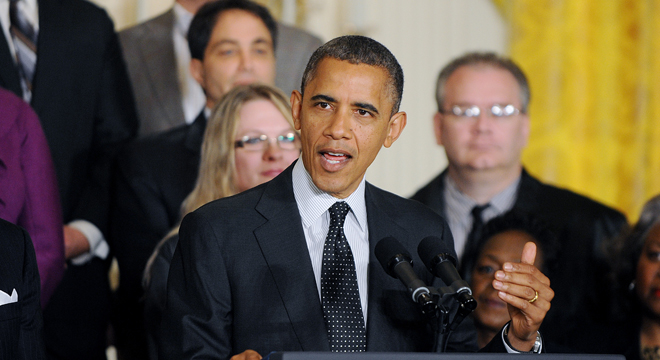When President Obama spoke at a small business in Hatfield, Pa., on Friday, he subtly knifed the GOP’s best hope for avoiding the expiration of Bush tax cuts on top earners.
“It’s not acceptable to me, and I don’t think it’s acceptable to you, for just a handful of Republicans in Congress to hold middle-class tax cuts hostage simply because they don’t want tax rates on upper-income folks to go up,” he said.
That sounds a lot like most of Obama’s campaign trail riffs about taxes and the wealthy. But his emphasis on the word “rates” on Friday was a key tell.
A number of Republicans — negotiating in earnest with, but at a distance from, the White House — have argued that Obama accept about $1 trillion of new revenues, almost all from wealthy earners, not by raising their rates, but by limiting the extent to which they can benefit from tax expenditures, i.e., the deductions, credits and loopholes which have become as American as apple pie.
The most visible of these proposals comes from Sen. Bob Corker (R-TN) — by way of, yep, Mitt Romney — to cap the value of itemized deductions at $50,000. The plan nets over $700 billion, almost all from high earners, without touching rates.
Sounds like a straightforward compromise, right? Well, it turns out that Republican and Democratic concerns about the impact of such a cap would likely weaken it enough that it would ultimately raise much less revenue. And with Obama’s comments Friday, he is now quite publicly casting the idea as inadequate, arguing it falls short of his demands.
The White House examined a related proposal to set the cap at $25,000, which by itself would raise over a trillion dollars. But because some 17 million middle-income Americans — homeowners with mortgages, people with high medical bills, and so on — claim more than $25,000 a year, a straight cap would effectively violate Obama’s pledge not to raise taxes on households making less than $250,000 a year.
If you limit the cap to households with incomes above that level, the revenue haul drops to $800 billion. But that also sets up a situation in which a household income that jumps from $249,999 to $250,000 would suddenly face a significantly higher tax burden. To avoid that, Congress would have to phase in the cap, lowering the revenue haul to $650 billion.
There’s an other elephant in the room, too. The deduction caps jeopardize a key Republican priority: the deduction for charitable giving. Members of both parties, including the Senate’s top Republican tax writer Orrin Hatch (R-UT), have consistently sought to protect the charitable deduction from the disincentives created by capping deductions.
“I want to encourage charitable giving in this country. I think a country that doesn’t do that is a country that’s going to be in real trouble,” Hatch said.
As we’ve reported, a cap on deductions would likely have a large effect on charitable giving, at least in the near-term, because reducing donations is functionally much easier than, say, moving into a smaller house.
Carve out the charitable deduction, and, according to the White House, the revenue haul drops to $450 billion — half of the down payment the White House is seeking.
That’s why Obama has cautioned that raising a trillion dollars from higher income Americans alone is difficult, if not impossible, on the deductions side of the tax code alone. Shorter Obama: no deal.










